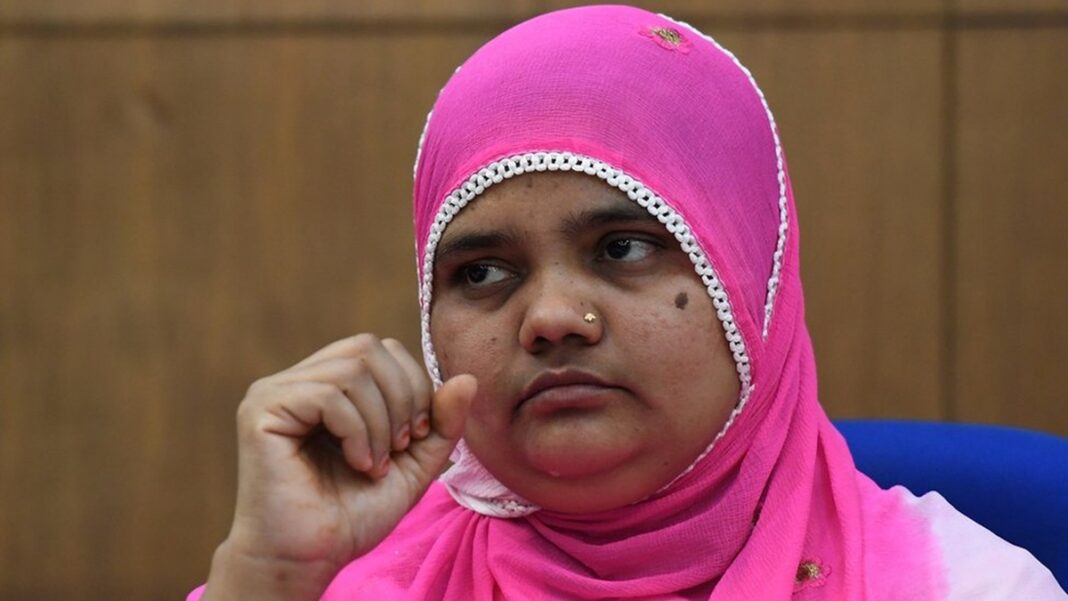In a significant ruling, the Supreme Court has rejected the Gujarat government’s plea seeking a review of its earlier decision to cancel the pardon granted to 11 men convicted in the 2002 rape and murder case involving Bilkis Bano’s family. The bench, consisting of Justices B.V. Nagarathna and Ujjal Bhuyan, found no merit in the appeal and dismissed it, affirming the previous court’s stance on the matter.
“Having carefully gone through the Review Petition, the order under challenge, and the papers annexed therewith, we are satisfied that there is no error apparent on the face of the record or any merit in the Review Petition, warranting reconsideration of the order impugned. The Review Petition is, accordingly, dismissed,” the bench stated.
The Gujarat government’s appeal had argued that the court’s findings, which criticized the state for “power grabbing” and “abuse of discretion,” were unfair. It referred to a May 2022 judgment that identified the Gujarat government as the competent authority to grant amnesty under the 1992 amnesty provision. The state contended that it was wrongly accused of being an “accomplice” to the accused, claiming that such allegations had caused significant prejudice to Gujarat.
Earlier, on January 8, the Supreme Court had ordered the immediate remand of the convicts and declared the Gujarat government’s amnesty order illegal. The court condemned the process through which the pardons were granted, describing it as a “fraud on the court” and highlighting various violations of legal norms.
Bilkis Bano was five months pregnant at the time of the violence following the Godhra train burning in February 2002. Tragically, her three-year-old daughter was among the seven family members who were brutally murdered. On August 15, 2022, the Gujarat government had controversially suspended the convictions of the 11 individuals, sparking widespread outrage and legal challenges.
This latest decision by the Supreme Court reinforces its commitment to justice in a case that has drawn national attention and highlighted the need for accountability in matters of violence and human rights violations.








clomiphene pills at dischem price how to get clomiphene without prescription how can i get generic clomiphene tablets cost of clomiphene at cvs cost of clomid without a prescription cost of generic clomiphene pills buying generic clomiphene pill
Thanks an eye to sharing. It’s outstrip quality.
zithromax sale – ofloxacin 200mg for sale oral flagyl 400mg
rybelsus for sale – semaglutide cheap periactin cost
buy motilium online cheap – buy motilium 10mg pills buy generic cyclobenzaprine over the counter
generic inderal – buy inderal 10mg pills brand methotrexate 5mg
buy amoxicillin tablets – order diovan generic purchase ipratropium generic
buy clavulanate without prescription – https://atbioinfo.com/ ampicillin cost
buy nexium online – https://anexamate.com/ nexium 20mg usa
oral coumadin 5mg – https://coumamide.com/ oral losartan
meloxicam generic – moboxsin.com order mobic online cheap
order deltasone 5mg generic – https://apreplson.com/ deltasone 40mg pill
buy ed pills – red ed pill best over the counter ed pills
amoxil price – https://combamoxi.com/ buy amoxicillin cheap
order fluconazole 100mg online cheap – flucoan order fluconazole
purchase lexapro for sale – https://escitapro.com/ generic lexapro 20mg
purchase cenforce generic – https://cenforcers.com/ purchase cenforce generic
cialis from india online pharmacy – https://ciltadgn.com/ cialis once a day
cialis online without pres – on this site best price for cialis
how to get zantac without a prescription – on this site order ranitidine 150mg online cheap
cheapest viagra buy cheap viagra – https://strongvpls.com/# 100 mg of sildenafil
More posts like this would persuade the online elbow-room more useful. generic prednisone names
More posts like this would make the online space more useful. https://ursxdol.com/amoxicillin-antibiotic/
More posts like this would create the online time more useful. https://prohnrg.com/product/orlistat-pills-di/
This is the kind of literature I in fact appreciate. https://aranitidine.com/fr/ciagra-professional-20-mg/
I’ll certainly bring to be familiar with more. https://ondactone.com/spironolactone/
I am actually thrilled to gleam at this blog posts which consists of tons of profitable facts, thanks towards providing such data.
avodart 0.5mg uk
More posts like this would make the online time more useful. http://zgyhsj.com/space-uid-977929.html
dapagliflozin 10mg without prescription – https://janozin.com/# buy cheap dapagliflozin
orlistat tablet – https://asacostat.com/ orlistat 120mg cost
Good blog you have here.. It’s obdurate to on elevated worth article like yours these days. I honestly comprehend individuals like you! Go through mindfulness!! http://zgyhsj.com/space-uid-979363.html
You can protect yourself and your stock by being heedful when buying prescription online. Some pharmacopoeia websites operate legally and sell convenience, solitariness, sell for savings and safeguards over the extent of purchasing medicines. buy in TerbinaPharmacy https://terbinafines.com/product/provera.html provera
Palatable blog you procure here.. It’s intricate to find elevated quality script like yours these days. I honestly comprehend individuals like you! Take mindfulness!! TerbinaPharmacy
More posts like this would bring about the blogosphere more useful.
Với giao diện mượt mà và ưu đãi hấp dẫn, MM88 là lựa chọn lý tưởng cho các tín đồ giải trí trực tuyến.
iwin – nền tảng game bài đổi thưởng uy tín, nơi bạn có thể thử vận may và tận hưởng nhiều tựa game hấp
Đến với J88, bạn sẽ được trải nghiệm dịch vụ cá cược chuyên nghiệp cùng hàng ngàn sự kiện khuyến mãi độc quyền.
Với giao diện mượt mà và ưu đãi hấp dẫn, MM88 là lựa chọn lý tưởng cho các tín đồ giải trí trực tuyến.
Đến với J88, bạn sẽ được trải nghiệm dịch vụ cá cược chuyên nghiệp cùng hàng ngàn sự kiện khuyến mãi độc quyền.
live casino baltimore maryland
casino bonuses
top us online casino